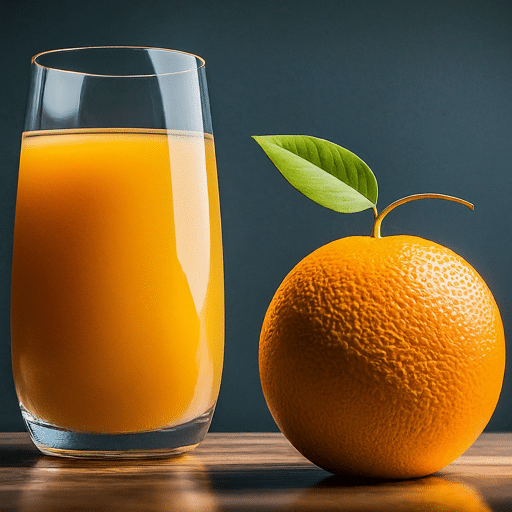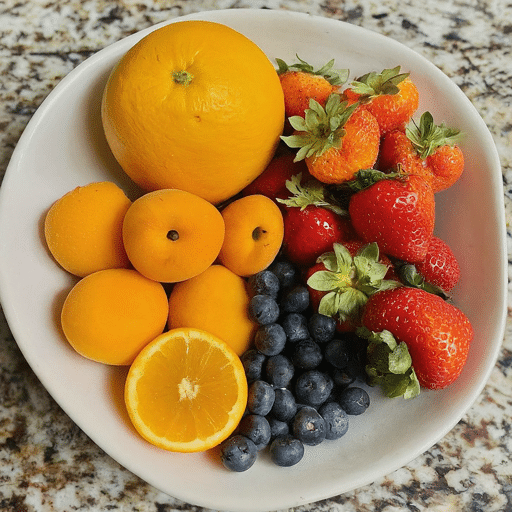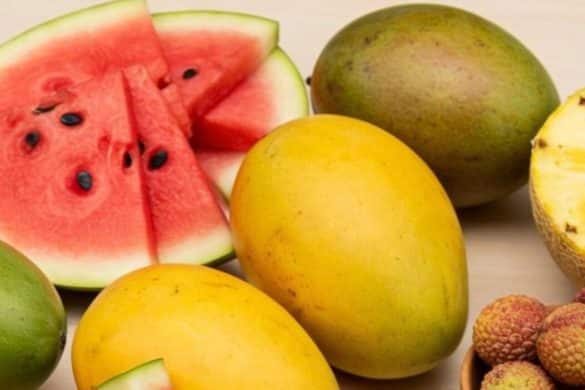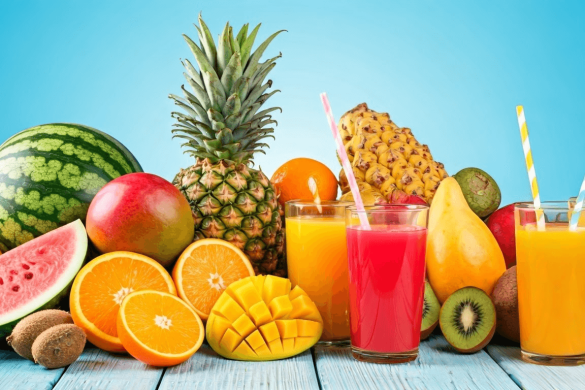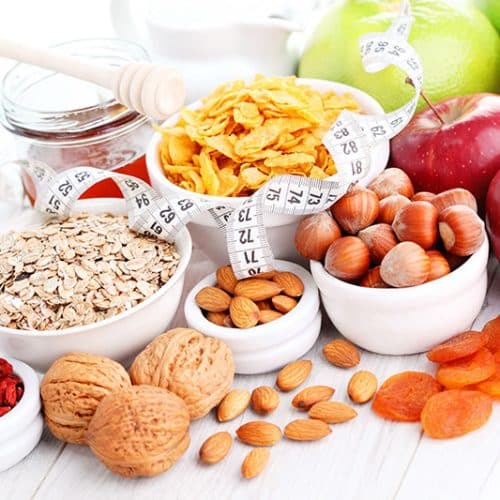When trying to decide between fruit and fruit juice, we often ask which is the healthier option. Both are delicious and can fit into a balanced diet, but they have key differences.
Fruits are full of vitamins, minerals, and fibre, which keep our bodies healthy. In contrast, fruit juices are easy to drink and feel refreshing, but they usually don’t have fibre and might have added sugars. Knowing these differences can help us make better choices for our health.
So, let’s talk about something important: fruit vs. fruit juice. Which one is better for a healthy life?
Whole Fruits Vs Fruit Juice: Which One Is Healthier?
Whole fruits are usually better for your health than fruit juice. This is because they have more fibre, less sugar, and include important nutrients. Though fruit juice is easy to drink, it often cuts the fibre that whole fruits have. This causes your body to absorb sugar faster.
Nutritional Value Comparison
Let’s take an example of whole orange fruit. Eating a whole orange is very different from drinking orange juice. A regular orange weighs about 140 grams and has 69 calories. In contrast, a typical glass of orange juice is around 248 grams or eight fluid ounces, and it has about 110 calories.
| Orange (Raw, All Commercial Varieties) | Orange Juice (Raw) |
| Energy – 69 kcal | Energy – 110 kcal |
| Carbohydrates – 16.27g | Carbohydrates – 25.79g |
| Sugars – 12.50 g | Sugars – 20.83g |
| Dietary Fibre – 3.6g | Dietary Fibre – 0.5g |
These numbers evidently indicate that eating whole fruit is better than drinking fruit juice. This way, we can better manage our calories and sugars. Whole fruit also gives us more dietary fibre.
Fiber Content and Digestion
Digestion in our bodies is about more than just getting nutrients. It is also about keeping our gut healthy and regular. This is where dietary fibre is very important. Whole fruits naturally have a lot of fibre.
Whole fruits have fibre that releases sugar into our blood more slowly than the quick sugars in the juice. This helps to prevent sudden blood sugar spikes. In addition, fibre can help with weight management. It can make you feel full, which stops you from eating too much. It also supports good bacteria in the gut that fight inflammation and help keep you healthy.
What are the Benefits of Whole Fruits over Fruit Juice?
Whole fruits bring a suite of benefits to the table that their juice counterparts may not offer entirely. Let’s delve deeper into these benefits.
1. Rich in essential nutrients
Eating fresh fruit gives you many important nutrients, like vitamins, minerals, and antioxidants. Whole fruits are rich in vitamin C. This vitamin is important for several body processes, like making collagen, supporting the immune system, and helping wounds heal. When you drink juice instead of eating whole fruits, you may miss out on these health benefits. This makes whole fruits a better option for your health.
2. Rich in dietary fibre
Dietary fibre plays a huge role in our diet. The fibre found in whole fruits helps keep our bowel movements regular, leading to good digestion. If we choose fruit juice instead, we often miss out on this fibre. Without fibre, juice can cause irregular bowel movements and poor digestion. This is a big downside to picking juice over whole fruits.
Dietary fibres can play an important role in weight loss. They help control blood sugar levels and improve diet management.
3. Manage hunger and cravings
Whole fruits have natural fibre that fills you up and keeps you feeling full. This makes them a good snack if you want to manage your weight and feel satisfied between meals. A glass of juice can have several fruits in it, which can raise your calorie intake a lot. However, eating one whole fruit does make you feel more full than juice does. The fibre in whole fruits helps take care of your hunger while keeping the calories low.
4. Food chewing is good exercise
Chewing is an easy but useful exercise for your face. It can help tone your facial muscles and improve your skin health. When you chew, your muscles work together, and it helps produce saliva, which is important for digestion. On the other hand, drinking juice often means you chew less, giving you fewer benefits.
So next time you have a fruit, think about eating it instead of juicing it. This way, you can give your facial muscles a good workout!
What are the Health Risks of Fruit Juice?
Even though drinking fresh fruit juice is enjoyable and easy, some risks can lessen its benefits. Let’s examine these issues to see when we should be careful.
1. Laxative effect
Juices, like prune and grape juice, have more natural sugars than the whole fruit. Prune juice has more sorbitol, and grape juice has more fructose. When you drink too much juice, it can act as a laxative. This means you might get loose stools or diarrhoea if you have a lot.
2. Higher sugar content
Many people know that most packaged fruit juices are full of added sugars. This leads to more calories than needed. What may be surprising is that fresh, home-squeezed juice can also add to calorie gain. When you drink juice, the sugars are quickly absorbed. This can cause big spikes in blood sugar. These spikes can lead to health problems like obesity and heart disease.
3. Loss of nutrients
Fruits are loved for their many nutrients. However, when you juice them, they might lose some important nutrients. Vitamins like C and B are sensitive to heat and light. The juicing process can break them down. This is especially true for commercial fruit juices. They often go through pasteurisation and are stored for a long time.
Additives and preservatives in packaged juices can reduce the nutrients in these juices even further. Because of this, eating whole fruits is a better choice if you want all the nutrition.
Conclusion
Knowing about fruit consumption can be tricky. However, having the right information helps you enjoy the benefits of nature. Whole fruits are a great choice. They are good for you because they have fibre, fewer calories, and keep their nutrients.
Fruit juices can also be helpful for some people, like those who have trouble chewing. When you pick juice, go for fresh, homemade options and make sure to keep the fibre.
Frequently Asked Questions
How much fruit juice should I consume daily?
The American Heart Association recommends a daily limit of 8 ounces, which is 240 ml or a small glass of fruit juice. They also stress the importance of eating whole fruit instead of just drinking juice for better health.
Is drinking 100% fruit juice as healthy as eating whole fruit?
No. Even 100% fruit juice has less fibre than whole fruit. It might also have more calories. This makes the nutrition from fruit juice less than what you get from whole fruits.
How does consuming whole fruits compare to drinking fruit juice in terms of health benefits?
Whole fruits are better than fruit juice. They have more fibre, important nutrients, and less added sugar. The fibre in whole fruits helps with digestion and controls blood sugar levels.

